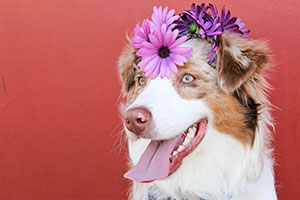The pet food market is a prime example of the hypocrisy of the large, multinational ‘Big Food’ companies.
Yet another multinational, Mars, is trying to claw back some of the decreasing market shares of its brands like Pedigree with the launch of Nutro in the UK. Nutro claims to have a “commitment to clean”. They say that a pet’s food “energizes them from the inside out” and that the recipes are “simple, purposeful and trustworthy - made of real, recognizable non-GMO ingredients”.
This stinks of hypocrisy. Nutro is not an independent company, it is a division of the confectionery company Mars. If the company, Mars, cared about ingredients being “real” and “recognisable”, then why not apply it to all pet products that they make? Mars is either ‘committed to clean’, or they are not.
Mars do the same thing with their James Wellbeloved brand. James Wellbeloved says that their recipe for a healthy living means, “no wheat, no cheap bulking ingredients, no artificial preservatives, flavours or colours”. How does the Mars management live with themselves, knowing this, then formulating their primary brand, Pedigree, with wheat, cheap fillers and artificial ingredients?
Mars isn’t alone in this. Nestlé’s Purina Beyond homepage questions “Do you really know what’s in your pet food”. Well, if you’re feeding their biggest brand, Purina Bakers the answer is a resounding “no” because they don’t make it clear on the label what is in the food. Purina Beyond claims to be selective about what goes in their food, “High-quality chicken, lamb or salmon as the #1 ingredient. No added wheat. No artificial colourants, flavouring or preservatives”. Then when you look at Purina Baker’s ingredients, cereals (including wheat) are the #1 ingredient making up over half of the food. Purina Bakers also seems to have dropped their “no artificial” claims - an investigation by Pooch and Mutt showed that Bakers did include artificial preservatives, such as BHT, but declared them as ‘antioxidants’ rather than ‘preservatives’. As the Nestlé Purina big chiefs seemingly know what is healthy for dogs, how can they purposely make one of their brands the complete opposite to this? Both Bakers and Beyond carry the Purina logo. How long is it until the public sees this logo as nothing more than corporate hypocrisy?
This is not to say that large companies purchasing smaller companies are always a bad thing, and disingenuous on the  side of the larger company. The purchase of Tails.com by Nestlé for a rumoured £120m+ / 10-15x sales is a great example of why a larger company should buy a smaller one. Innovation is stifled in large companies, and developing a direct to consumer brand would take an enormous amount of time. Much better to buy a company who has done all the hard work and roll that out across the world. That is a win for both Nestlé and Tails.
side of the larger company. The purchase of Tails.com by Nestlé for a rumoured £120m+ / 10-15x sales is a great example of why a larger company should buy a smaller one. Innovation is stifled in large companies, and developing a direct to consumer brand would take an enormous amount of time. Much better to buy a company who has done all the hard work and roll that out across the world. That is a win for both Nestlé and Tails.
Acquisitions of smaller brands by larger brands are nothing new. It’s rife at the moment; Heineken owns craft beers brands like Beavertown, Coca-cola owns Innocent and recently bought Costa Coffee, but in the pet world it’s different. When a consumer buys pet food they are buying for an animal who has limited abilities to communicate how the food makes them feel, so it is a greater responsibility. More importantly, pet food seems to be the only category where the marketing messages of the smaller brands are focussed on highlighting why the larger brands are bad for dogs. And at the same time, the larger brands like Pedigree and Bakers sell on their ‘health benefits’. The same company is saying that their main brands are both good for dogs, and bad for dogs at the same time.
An even bigger hypocrisy is about to hit the pet market.
One of the most important issues at the moment is the environment and the recyclability of packaging. Pet food pouches are notoriously difficult to recycle.
The solution would be working with TerraCycle, a company who can recycle this difficult-to-recycle packaging. Pooch & Mutt, along with a few other pet food companies have been in discussions with Terracycle about launching a national recycling scheme for pouches. However, one ‘Big Pet Food’ company have swooped in with their deep pockets and signed a 2-year exclusivity deal to prohibit other companies working with TerraCycle and offering to recycle for their packaging.
 This is not a call out to Big Pet Food to stop their acquisitions or to not use companies like Terracycle to offer to recycle.
This is not a call out to Big Pet Food to stop their acquisitions or to not use companies like Terracycle to offer to recycle.
This is a call out, to be honest, and be ethical.
If these companies care about the environment, why prohibit other companies from using a recycling scheme? Why not work with all other manufacturers to create a national programme to help customers recycle all brands of pet food pouches, instead of just one?
If these companies care about high-quality ingredients in food, why not apply it to all brands?
The internet has given customers transparency to business. Customers want the brands they buy from to behave honestly and ethically. It’s time for Big Pet Food to start learning from the small brands that they are buying and to apply those learnings to their existing brands.

 side of the larger company. The purchase of
side of the larger company. The purchase of  This is not a call out to Big Pet Food to stop their acquisitions or to not use companies like Terracycle to offer to recycle.
This is not a call out to Big Pet Food to stop their acquisitions or to not use companies like Terracycle to offer to recycle. 